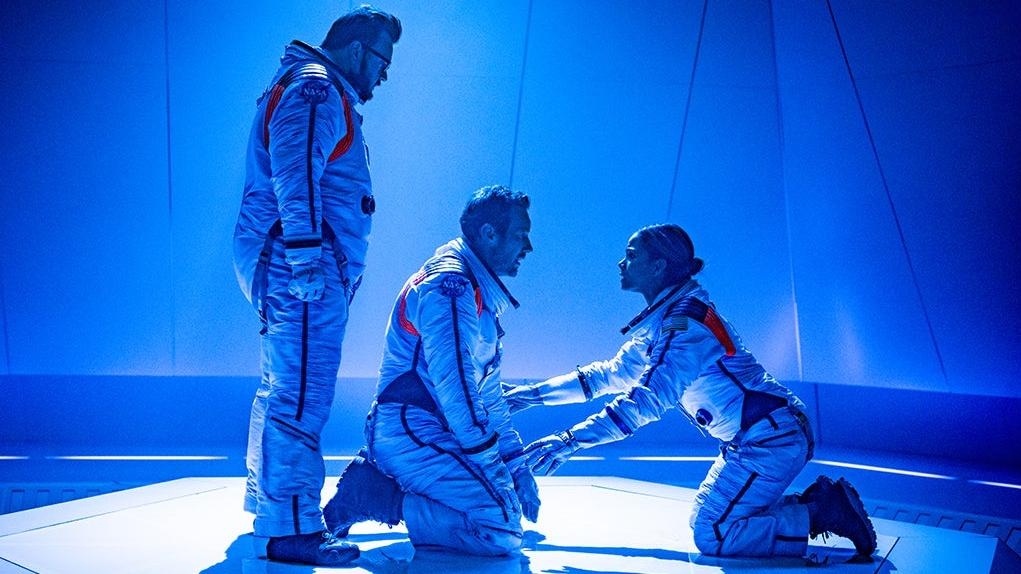Moonfall is a moonfail
When the moon hits your eye like a big pizza pie, that’s… not exciting enough

A quick poke around YouTube will turn up multiple computer-animated videos demonstrating what Earth’s sky would look like were the moon’s orbit significantly closer (or, say, were the planet instead orbited by a giant banana). Offering a more expensive, more spectacular, much dumber version of that hypothetical scenario, Roland Emmerich’s Moonfall imagines a global crisis in which a handful of courageous Americans (plus one expat Brit) must team up to prevent our natural satellite—which may not be so natural after all—from veering so close that it’ll be torn apart by Earth’s tidal forces and rain a zillion civilization-ending meteors down upon us. (That’s an actual phenomenon, triggered at a specific distance called the Roche limit—a rare instance of Moonfall being scientifically accurate. Interstellar this ain’t.) The film’s more or less a mashup of Emmerich’s two wheelhouses: alien contact (Stargate, Independence Day) and cataclysmic disasters (The Day After Tomorrow, 2012), with some Armageddon thrown in for good measure. You will actually hear your brain cells commit seppuku as you watch it.
For no very good reason—a phrase that describes numerous aspects of this movie—Moonfall opens a decade ago, introducing astronauts Jocinda Fowler (Halle Berry) and Brian Harper (Patrick Wilson) as they perform satellite maintenance. A barely seen object impacts the moon, sending debris flying and causing the death of a third astronaut who might as well have been wearing a red Star Trek uniform. Harper, who insists that he witnessed an intelligent entity, gets drummed out of NASA, only to be vindicated 10 years later when astronomers observe that the moon’s orbit has suddenly shifted, with the body now approaching Earth so rapidly that the next three months (as orbitally defined) will last only three weeks… at which point the moon will disintegrate.
As it inevitably turns out, Harper, who once successfully landed a spacecraft that had lost all power, is the only person qualified to save the world, though he’ll need the help of both Fowler, whose prior lack of support he resents, and an amateur astronomer and “mega-structuralist” named KC (John Bradley, best known as Samwell on Game Of Thrones).
KC’s a perfect example of how inept Moonfall can be even by the relatively low standards of big-budget popcorn fare. The character functions primarily as comic relief—he’s an excitable nerd—but also fills a standard disaster-movie role: the ordinary schmo who first spots some anomaly and struggles to get those in power to believe him. KC works as a university janitor, sneaking into professors’ offices and downloading satellite data, and he figures out on his own that the moon’s orbit has altered. (He also believes that the moon is artificial and hollow, but skip that for now.) “You knew all this was happening before NASA,” Harper marvels at one point.
KC didn’t, though. We’re shown NASA scientists coming to the same conclusion at roughly the same time, because Berry’s continuing presence in the movie (Fowler still works at NASA) would otherwise be superfluous. KC does make the information public, but that’s fairly irrelevant too, as people would have noticed the gigantic moon and the massive tidal flooding and the gravitational wonkiness soon enough without his help. He’s really just around because the formula demands at least one impassioned, goofy everyman who can crack the occasional joke.
Still, at least Bradley, while frequently annoying in his exuberance, has a demonstrable pulse. Berry and Wilson are stuck playing utterly generic can-do types, and you can practically see them grimacing through much of their alternately functional and dopey dialogue. Asked to fly to the moon and find out what’s causing the aberration, Harper initially declines, insisting that he’s got his own problems to deal with. Fowler’s incredulous, instant-camp-classic reply: “And the moon falling onto Earth isn’t one of them?!” Other so-bad-they’re-hilarious moments include Fowler’s estranged husband (Eme Ikwuakor) pulling a gun on his military superiors right before they attempt to nuke the moon (with Fowler on it), and Harper’s teenage son (Charlie Plummer) getting pinned by a huge uprooted tree trunk and then rescued by the moon’s gravitational pull as it rises over the entire horizon. Pity poor Donald Sutherland, who literally gets wheeled out for perhaps the most pointless cameo in cinema history, and Kelly Yu, playing a heroic exchange student whose intended appeal to the crucial Chinese market couldn’t be more transparent.
Does Moonfall at least deliver the F/X goods? Yes and no. The natural-disaster stuff—massively destructive tsunamis, fireballs, earthquakes, etc.—is so familiar at this point as to be soporific, and placing a much larger moon in the background of those shots doesn’t make them significantly more thrilling. (This time it’s the Chrysler Building that goes down in New York City; the rebuilt One World Trade Center, a.k.a. the Freedom Tower, is pointedly left standing.)
More entertaining, but also painfully stupid, is the moon’s big secret (as predicted by ostensible crackpot KC), which involves a malevolent form of artificial intelligence. Visually, this lifeform is as close as we’ve come to an adaptation of Prey, Michael Crichton’s novel about homicidal nanobots. There’s also some Contact-adjacent hooey—benign intelligence presenting as holographic loved ones, constructed from the person’s memories—and the design team’s best guess at what the interior of a Dyson sphere might look like. Emmerich just tossed every sci-fi and disaster trope he could think of into a blender and hit “liquefy.” The result’s a whole lot lumpier than most palates will prefer.